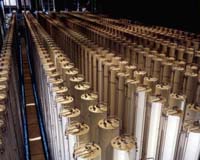 |
Washington (AFP) Feb 12, 2010 China, increasingly isolated within the UN Security Council over Iran's nuclear program, appears more likely to yield to US-led calls to impose new sanctions against Tehran, experts say. With Russia hardening its stance toward Iran, China is the sole holdout at the Security Council as it pushes for further negotiations to resolve the showdown over Iran's uranium enrichment program. The United States also has backing for sanctions from Britain and France -- the others among the five veto-wielding council members -- as well as from Germany, a key player in negotiations with the Islamic republic. James Dobbins, who dealt with Iran when he was president George W. Bush's envoy to Afghanistan in 2001 and 2002, told AFP he suspects China will either eventually endorse sanctions or at least not stand in the way of them. "It's very unusual for China to veto a resolution on its own unless it affects something that is pretty directly relevant to China," said Dobbins, now an analyst with the Rand Corporation, a think tank. "If it doesn't involve Taiwan or something the Chinese regard as related to their sovereignty they have been very reluctant to become isolated in that fashion," he said. Despite its reluctance to support punitive measures against Iran, China signed on to the last three Security Council resolutions that imposed sanctions on Iran, albeit diluted ones. "Now of course China is becoming more self confident and it's not impossible it would break precedent in this regard," Dobbins said. China, now accepted by Washington as a key world power, warned the United States on February 2 that their cooperation on international and regional issues could suffer over Washington's decision to sell arms to Taiwan. "But I tend to think that if there's an otherwise uniform support in the Security Council that the Chinese would probably abstain, if they were not prepared to vote for (sanctions)," he said. Dobbins said the Iranian leadership knows full well it faces a "fairly credible" threat of sanctions, but may very well decide to stick to their guns on their uranium enrichment program. However, even if Iran is unswayed by sanctions, he said, the Islamic republic will find it harder to both obtain the nuclear-related parts and technology and to project power and influence in the region. He said sanctions could help boost the trend for political change in Iran by "delegitimizing elements of the regime" as well as discourage other countries from pursuing Iran's suspect program for fear of becoming a pariah state. The United States is pushing for sanctions against the Islamic Revolutionary Guard Corps, which is understood to run the nuclear and missile programs, support militant groups and crackdown on anti-government protests. Analyst Karim Sadjadpour predicted that "China will ultimately conclude that the potential costs of supporting diluted sanctions is less than the potential costs of being the lone holdout." He was not sure they would back sanctions against the Revolutionary Guard. From an economic perspective, the Carnegie Endowment for International Peace analyst said, Iran needs China more than the other way around. "It's not that Tehran is going to react (to sanctions) by ceasing its commercial and political ties with Beijing. They've become incredibly dependent on China," Sadjadpour said in an email exchange with AFP. "On the other hand, US officials have frequently impressed upon the Chinese that the risk of an Israeli attack goes up considerably if a UNSC resolution is not passed, which would cause oil prices to skyrocket," he said. China's rapidly growing economy is fueled by abundant and relatively cheap supplies of oil. Diluted UN sanctions would have more of a political than economic impact "because they make clear this is not simply a Western front against Iran," Sadjadpour said. "The more consequential sanctions will come out of Europe and the United States." The State Department appears guardedly optimistic that China will eventually support sanctions. "They have signed on to every statement and every step the international community has taken up to this point," State Department spokesman Philip Crowley told reporters on Tuesday. He acknowledged "a difference of viewpoint in terms of what the next steps should be," but said Iran's move this week to enrich uranium to 20 percent purity "clearly strengthens our hand" in pushing for sanctions.
Share This Article With Planet Earth
Related Links Learn about nuclear weapons doctrine and defense at SpaceWar.com Learn about missile defense at SpaceWar.com All about missiles at SpaceWar.com Learn about the Superpowers of the 21st Century at SpaceWar.com
 US casts doubt on Iranian enrichment claims
US casts doubt on Iranian enrichment claimsWashington (AFP) Feb 11, 2010 The White House Thursday blasted Iran's nuclear declarations as based on politics more than physics, casting doubt on Tehran's claims to have produced its first stocks of highly enriched uranium. Washington ratcheted up a war of words with Iran's leaders, after Tehran declared itself a nuclear nation on the 31st anniversary of the Islamic revolution and at a time of rising domestic political ... read more |
|
| The content herein, unless otherwise known to be public domain, are Copyright 1995-2010 - SpaceDaily. AFP and UPI Wire Stories are copyright Agence France-Presse and United Press International. ESA Portal Reports are copyright European Space Agency. All NASA sourced material is public domain. Additional copyrights may apply in whole or part to other bona fide parties. Advertising does not imply endorsement,agreement or approval of any opinions, statements or information provided by SpaceDaily on any Web page published or hosted by SpaceDaily. Privacy Statement |